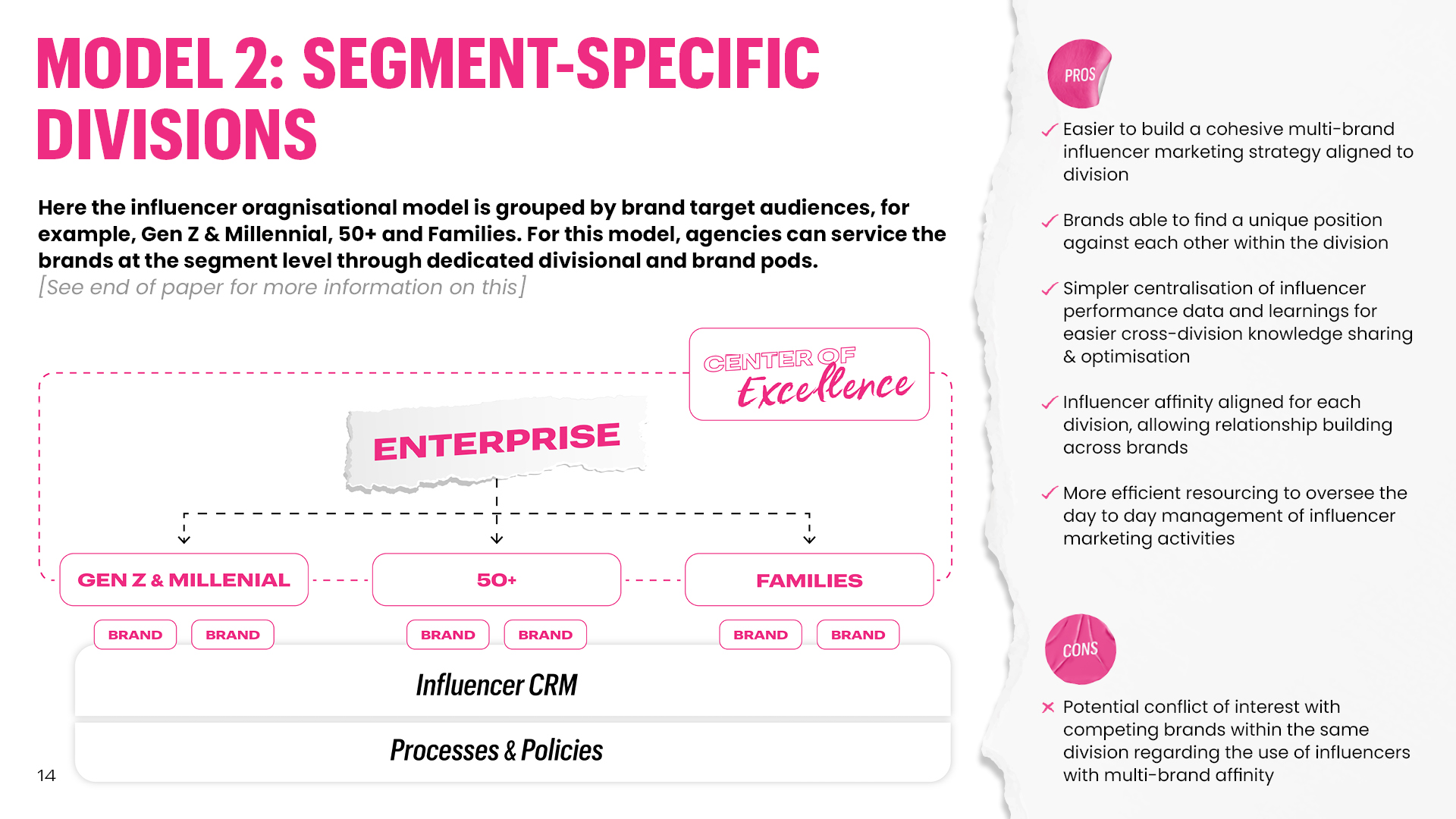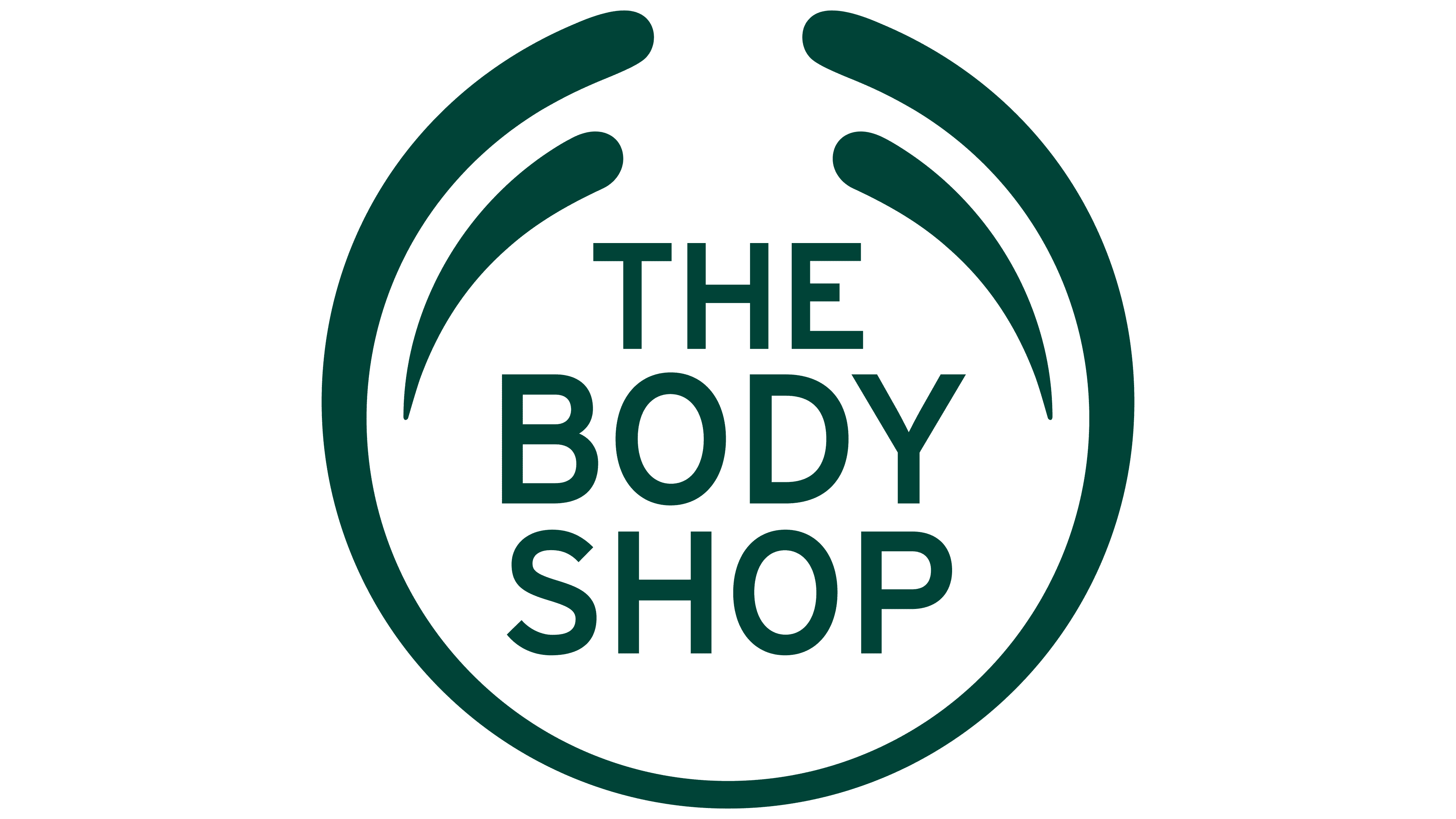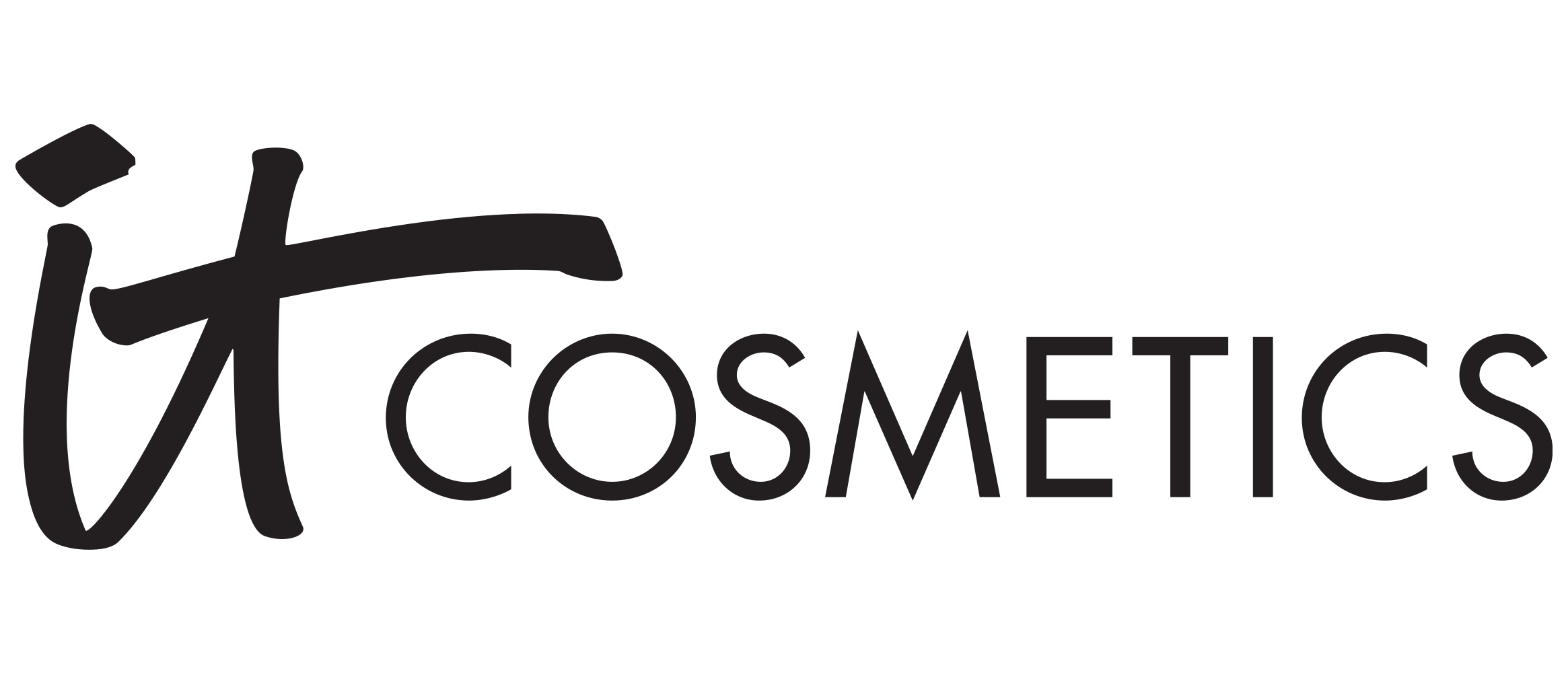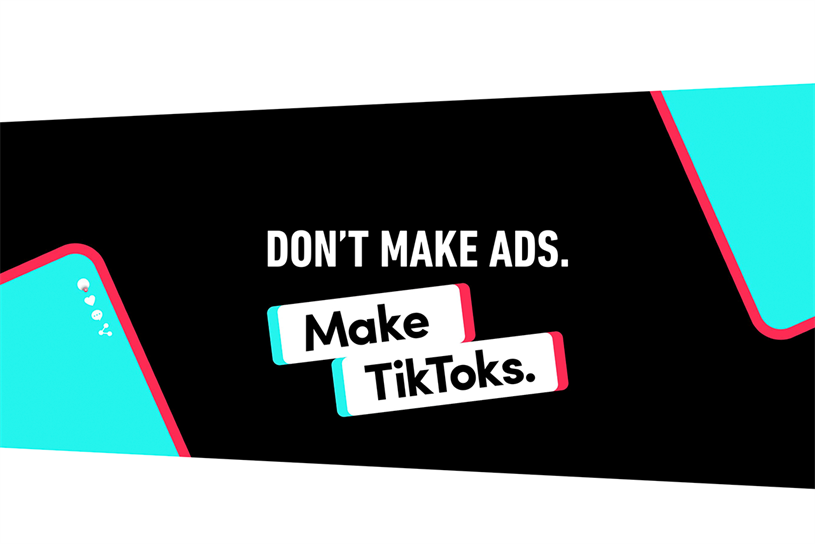How could your organizational model for influencer marketing be impacting the efficiency of your enterprise influencer strategy?







Exploring the three most common organizational structures for influencer marketing, looking at the positives and negatives of each when it comes to setting and executing influencer marketing strategies across enterprise businesses.
How do you ensure consistency and efficiency of influencer marketing across a multi-brand portfolio?
For enterprise businesses with a multi-brand portfolio it is common practice for the influencer marketing strategy to be set at the enterprise level but then executed at the brand level. The challenge here lies in aligning the influencer marketing efforts across diverse brands through a unified strategic vision.
A successful influencer marketing approach takes the focused enterprise level strategy and executes this through an efficient organizational structure where every stakeholder possesses clear expectations and defined roles in realizing success. Without alignment, influencer marketing activities risk deviating from overarching business and marketing objectives.
What is an organizational model for influencer marketing?
In more general terms, an organizational model is the structure that represents the different components of an enterprise business, leveraged to enhance operations in pursuit of business objectives.
In the case of influencer marketing this relates to how different teams are structured to support the actualization of the enterprise’s marketing vision and goals. An organizational structure for influencer marketing encompasses the processes, governance, tools, and standardization necessary to effectively execute influencer campaigns and achieve marketing objectives.
Influencer marketing becomes increasingly difficult to govern when deployed across enterprise business with multi-brand portfolios.
Influencer marketing is usually executed at a local or brand level. With this in mind, when there is no structure in place to ensure efficiencies across everything from spend, execution, legal practices and so on, influencer marketing can become almost impossible to manage effectively.
Although all organizational models serve the same purpose, there are a variety of different structures each with unique advantages and disadvantages. Therefore, understanding the nuances of each model is crucial for maximizing efficiency and effectiveness in influencer marketing endeavors by influencer marketing agencies or teams.
Please note, there is no right or wrong answer when it comes to selecting organizational models. Decisions should be informed by business and marketing objectives.
Why is the right organizational model important for Influencer Marketing?
Influencer marketing presents its own set of unique advantages and challenges for enterprise businesses.
For businesses with broad brand and product portfolios, influencer marketing offers unparalleled strategic customization. By selecting the right influencer, businesses can execute activities that support any objective (e.g. conversion or engagement) as well as open access to a wide variety of audience segmentations.
With such diverse strategies for leveraging influencer marketing to achieve specific goals, brands often find justification in tailoring their strategies to their unique brand identities & objectives, leading to siloed working environments when businesses own multiple brands. Consequently, this tendency frequently results in a misalignment with the overarching enterprise-level strategy and a loss of efficiency.
By defining an organizational model that groups teams (brands) by shared objectives when it comes to influencer marketing activities e.g. targeting the same audiences, leaders can create an efficient way of working, streamlining the management of these teams in line with strategy execution and resource allocation.
When businesses operate through the most suitable organizational model for their portfolio they often see an uplift in the following efficiencies…
- Simplified setting and execution of the influencer strategy across multi-brand portfolios due to synergies identified.
- Streamlined centralization of data and learnings to support easier cross-team knowledge transfer due to a more efficient and standardized way of working.
- Establishment of a multi-brand influencer portfolio of partners who can speak across-brands and/or products, saving time and costs in executing influencer campaigns.
- Efficient cross-team influencer fees and performance benchmark to support continuous optimization of influencer marketing campaigns and cost transparency.
What are the different types of organizational models for Influencer Marketing and how do I know which is right for me?
When it comes to organizational models the possibilities are endless, but for the purposes of this overview, we are going to focus on the three most common models we have seen when executing the end-to-end influencer strategy across a variety of enterprise businesses, with an overview on the positives and negatives of each.
Model 1: Brand Autonomous Divisions

Model 2: Segment-Specific Divisions

Model 3: Category Specific Divisions

In conclusion, the organizational models for influencer marketing each have distinct advantages and drawbacks.
The first model, where brands operate independently, offers tailored strategies and agility but suffers from siloed operations and challenges in synergy, scalability, and data centralization.
The second model, based on segment-specific divisions, enables cohesive multi-brand strategies and streamlined data management but may introduce conflicts among competing brands within the same division.
The third model, focused on category-specific divisions, provides category expertise and differentiation opportunities but faces difficulties in maintaining a consistent brand strategy across divisions if brands have products across categories.
So when leaders are looking to define a structure for deploying influencer marketing across a multi-brand portfolio it is important to consider where brands can sit in line with the different organizational models. Furthermore, organizations should give thought to the idea of building hybrid models across all three to suit their brand and business needs.
Conclusion
As influencer marketing continues to rise within modern marketing strategies, it’s imperative for enterprises to ensure their approach operates at peak efficiency. Achieving success in influencer marketing demands not only a bespoke strategy but also an organizational framework that optimally supports its execution.
With the landscape evolving rapidly, using an agency partner to support and provide insight on strategic understanding of organizational models in influencer marketing can support enterprises striving to maintain a competitive edge and looking to maximize their returns on investment. A few services that use these organizational models are:
- Influencer marketing agency US
- Influencer marketing agency United Kingdom
- Instagram influencer marketing agency
- Facebook influencer marketing agency
- Youtube influencer marketing agency
The Role of agencies in facilitating efficient and effective ways of working across your organizational model
Leveraging an experienced agency partner to support your influencer marketing strategy, regardless of the organizational model, providing our clients with…
- Expertize and Consultation: Providing specialist insight and recommendations as to which organizational model will be most effective for your portfolio based on experience with other influencer marketing clients
- Bespoke Strategies: Regardless of whether your strategy needs to be set across multi-brand divisions or are required to serve a brand agnostic approach, agencies can build bespoke strategies for influencer marketing
- Influencer Identification: Helping your brands identify the right influencer partners with cross divisional/brand potential
- Processes, Governance & Standardization Enforcement and education on portfolio wide adoption of standardized influencer processes such as contracting and influencer briefing templates to support a brand safe and consistent approach to influencer marketing
- Influencer CRM systems: Building a central influencer database with constantly updated metrics, data and fees to create transparency across the portfolio and facilitate cost effective influencer negotiation.
- Collaboration and Communication: Facilitating communication and collaboration between the various brands and divisions across the organizational model to create a streamlined approach to knowledge sharing. As well as supporting the establishment and management of a Centre of Excellence at a global level to cascade learnings, templates and ways of working across the business.
- Continuous Optimisation: Using data collated across the different brands and divisions to make data-driven decisions and optimize influencer strategies.
- Change Management: Providing an external perspective and influencer marketing experience to give your team the knowledge and support to facilitate an internal restructure by defining the right model for your specific requirements.
- Scaling Influencer Activities: Agencies act as a specialized team with the experience and existing infrastructure to support a streamlined approach to scaling influencer activities across the organization.
Empower your brand’s transformation journey with PrimeInfluence from Socially Powerful, a full service influencer marketing solution
PrimeInfluence is Socially Powerful’s solution & service to help enterprises transform influencer marketing to be more efficient and effective.
These white papers offer some initial guidance on how to start your influencer marketing transformation journey.
Leveraging a suite of guidance, frameworks and proprietary digital tools built through Socially Powerful’s vast experience & expertize in influencer marketing.
Empower your influencer marketing transformation journey today, with PrimeInfluence by Socially Powerful.
Access expert guidance across:
- Organizational Models for Influencer Marketing
- Influencer Marketing Centre of Excellence
- Influencer Marketing Centralization for Efficiency and Cost Transparency
- Influencer Marketing End to End Large Scale Programmes
- Influencer Led Content Production
- Influencer Marketing Dynamic Creative Optimization
As part of the PrimeInfluence Solution we build integrated influencer marketing functions for our enterprise partners led by category leaders to support individual brand pods.
We establish dedicated influencer marketing functions within the Socially Powerful for our enterprise partners.
These micro-agencies deliver bespoke influencer marketing strategies through category leads that connect the team to each division within the business.
Ensuring each brand has access to the collective power of the agency but benefits from a bespoke touch through their category lead and brand pod.
We'll show you how to start powerful conversation, drive social engagement, build your brand, hit sales targets or meet other goals you have, wherever you are in the world.
Work with us






















